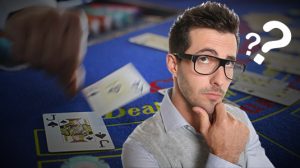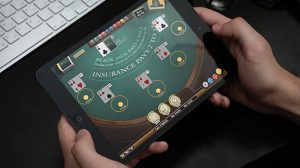Können Sie sich Blackjack selbst beibringen und gewinnen?
GeschriebenWir alle kommen auf unterschiedlichen Wegen zu den Tischen. Ich bin zwar kein Hardcore-Blackjack-Spieler, aber ich genieße das Spiel und setze normalerweise etwa 20% meiner Bankroll dafür ein. Ich werde versuchen, einige der Fallstricke aufzuzeigen, mit denen ich konfrontiert wurde, als ich das Spiel erlernte und zu lieben lernte. Anfängern und Neulingen erspare ich damit vielleicht einigen Kummer, ganz zu schweigen von Geld, und erfahrene Spieler können sich über meine Dummheiten amüsieren.

Ich habe schon als Kind zum Spaß Twenty-One gespielt. Blackjack und Poker waren in meinem Haus Familienspiele. Mein Vater oder meine Mutter holten samstagabends den Penny-Topf heraus, teilten das Geld auf und los ging's. Natürlich würde ich das niemandem empfehlen, und ich habe das auch nicht mit meinen Kindern gemacht, aber das waren andere Zeiten.
Wir spielten nach den alten Las-Vegas-Regeln mit nur einem Deck, außer dass der Gewinner der letzten Runde der Geber für die nächste Runde war. Es dauerte nicht lange, bis ich merkte, dass ich, egal wie gut ich spielte, so oft wie möglich der letzte sein wollte, der am Ende des Spiels noch steht.
Lernen auf die harte Tour
Während ich die Grundlagen einfach durch Spielen lernte, wusste ich erst viel später über optimale Strategien Bescheid. Ich hatte auch meine eigene Zählmethode, von der ich später mit einigem Aufwand erfuhr, dass sie sehr fehlerhaft war. Aber das erfuhr ich erst, als ich begann, mich mit Blackjack online spielen.
Wenn bei unserem Spiel der Geber gewann, durfte er das nächste Blatt austeilen, aber alle gespielten Karten wurden unter dem Deck verbrannt, bis keine neuen Karten mehr übrig waren. Es ist leicht zu verstehen, wie ich den Überblick über wichtige Karten behalten und meine älteren, klügeren Familienmitglieder gelegentlich schlagen konnte.
Als eifriges Kind, das die Karten um jeden Preis haben wollte, entwickelte ich auch die schlechte Angewohnheit, Ahnungen zu spielen, ohne Daten zu haben, und sogar Dinge zu tun, die ich jetzt nie tun würde, wie Zehner zu teilen oder einen Neuner zu verdoppeln, ohne Rücksicht auf die Hand des Dealers.
Meine ersten Prügel erlebte ich in den Männercamps in Wyoming, als ich auf den Ölfeldern arbeitete. Wir waren in einem abgelegenen Außenposten für sechs 16-Stunden-Tage am Stück eingesperrt, mit einem freien Tag pro Woche für drei Wochen und dann jede vierte Woche frei. Ich habe in den Zimmern viel gespielt und mehr verloren, als mir lieb ist. Aber das war nichts im Vergleich zu den Ausflügen ins Jolly Roger einmal im Monat. Das Gasthaus ist heute wieder ein respektables und sicheres Familienrestaurant, aber in den späten 1970er Jahren war es ein Irrenhaus mit betrunkenen Raufbolden, die es auf eine Schlägerei abgesehen hatten, arbeitenden Mädchen, Unerwünschtem, häufigen Schlägereien, Menschen, die aus dem Fenster geworfen wurden, und natürlich viel Blackjack und Poker, bei denen eine Handvoll Zwanziger und Hunderter immer wieder den Besitzer wechselten. Es war nicht zu vergleichen mit dem, was man als Kind zu Hause oder online spielen konnte.
Unnötig zu sagen, dass dieser Dummkopf mit meinen "Spiel-nach-dem-Bauch"-Methoden, meiner halbgaren Strategie und meiner schlechten Kartenzählung, bei der die Karten zwischen den Händen gemischt wurden, mehr als einmal von seinem Geld getrennt wurde.
Das letzte Mal, dass ich gespielt habe, bevor ich mich hingesetzt und mir die Zeit genommen habe, um herauszufinden, was wirklich mit dem Spiel los ist, war, als ich in der Wüste von Nevada bei einem Zauntrupp gearbeitet habe. Die Wochenenden verbrachten wir in einem Hotel-Casino in der Grenzstadt, und Sie können sich wahrscheinlich vorstellen, mit wie viel Geld ich nach Hause kam, als der Job vorbei war. Ich denke, ich habe es auf die harte Tour gelernt. Schließlich gab es keine Online Blackjack Schulen Damals.
Ich lernte das Spiel zu spielen und zu schätzen, nachdem ich ein paar Jahre lang online gespielt hatte, hauptsächlich an Spielautomaten und Tischen. Ich sah immer wieder Hinweise auf Strategiekarten und hatte mich in einigen Foren mit ein paar erstklassigen Spielern angefreundet, die meist in landbasierten Casinos um hohe Einsätze spielten. Ich bearbeitete sie für alle Informationen, die ich aus ihnen herausholen konnte. Ich kopierte ein paar Strategiekarten von Hand, um die Informationen schneller zu verinnerlichen, und begann, einige Übungsspiele zu spielen. Nachdem ich eine Website gefunden hatte, auf der ich meine Einsätze auf einen Dollar senken konnte, wagte ich den Sprung und begann, mein Spiel zu verfeinern.
Der Rest ist Geschichte, wie man so schön sagt. Jetzt kann ich mithalten und gewinne so oft wie möglich, und ich bekomme viel Spielzeit für eine kleine Einzahlung. Ich werde zwar nie das Wasser reichen können Spieler wie Ken Smith Das ist okay, ich muss nur den Dealer schlagen.
Meine Gedanken zum Online-Spielen
Soweit VorteilsnahmeIch halte nicht viel von der Kartenzählung beim animierten Online-RNG-Spiel. Es scheint mir einfach zu viel Arbeit zu sein, mir vorzustellen, einen Schuh mit sechs Kartendecks zu zählen, der nach jeder Runde neu gemischt wird. Die Gewinnspannen sind zu gering und die Stichprobengröße ist für meinen Geschmack viel zu groß. Es könnte ein lustiges Hobby sein, wenn ich im Ruhestand bin.

Ich neige dazu, online nach einem Single-Deck-Spiel mit anständigen Regeln zu suchen. 3:2, Verdoppelung von zwei beliebigen Karten, Split Aces im Minimum. Ich habe noch kein Spiel mit diesen Regeln und einem Dealer-Stick auf Soft 17 gefunden. Es gibt zwar immer noch ein paar 3:2 Single-Deck-Spiele, aber die meisten von ihnen haben ziemlich hohe Mindesteinsätze. Einige Anbieter ändern die Regeln ein wenig und verdoppeln nur bei 10 oder 11. Man muss etwas aufgeben, und es ist selten, dass man auf neun verdoppelt. Ich werde dieses Spiel trotzdem spielen. Sobald diese Regeln bekannt sind, suche ich nach mehr als einem Platz.
Ich werde nicht auf die Mathematik eingehen, aber es reicht zu sagen, dass, wenn ich auf drei oder mehr Hände setzen kann, die zweite Hand höher gesetzt wird als die erste und jede Hand in der Reihe von rechts nach links eine deutlich höhere Gewinnchance hat, weil ich mindestens sieben Karten gesehen habe (2+2+2+D), bevor ich die erste Entscheidung treffe. Wenn die Hände, die dem Dealer am nächsten sind, mit mehreren Splits oder Hits enden, habe ich schon einige Karten gesehen, bevor ich eine Entscheidung für die 3., 4. oder 5.
Es gibt eine Reihe von Möglichkeiten für jede Hand, und ich werde irgendwann dazu kommen, das für den Betrag, den ich an jedem Platz setzen muss, zu berücksichtigen. Im Moment setze ich einfach "mehr" und verdopple in der Regel den Einsatz für jede Hand.
Gut geschrieben, aber Sie zeigen entweder ein extrem begrenztes Wissen darüber, wie Kartenzählen funktioniert, oder Sie versuchen absichtlich, weniger erfahrene Spieler in die Irre zu führen. Mir ist aufgefallen, dass Sie mehrmals das Online-Spielen erwähnen und einen direkten Link zu einem bestimmten Online-Casino angegeben haben.
Es stimmt, dass Sie beim Indexspiel mehr Informationen für die 2. Hand und darüber hinaus zur Verfügung haben. Der Vorteil der zusätzlichen Informationen reicht jedoch nicht einmal annähernd aus, um den Hausvorteil auszugleichen, und Sie sollten Ihren Einsatz nicht bei jeder folgenden Hand verdoppeln. Das ist ein Rezept für eine Katastrophe.
Hallo Gronbog, danke für die freundlichen Worte und die Kritik. Meine Absicht war es nicht, das Zählen zu lehren, sondern einfach ein autodidaktisches System zu beschreiben, das mit Fehlern und den unvermeidlichen Ergebnissen behaftet ist. Damals habe ich nur Zehner und Asse gezählt, um ein Gefühl dafür zu bekommen, wie viele Karten noch übrig waren - ich habe etwa 1/3 der einfachsten möglichen Strategie angewandt und weder den Zehnern noch anderen Karten einen Wert zugewiesen. Ich glaube, es ging darum, gerade genug zu wissen, um in Schwierigkeiten zu geraten. Es funktionierte gut, solange das Deck bei jeder Runde kleiner wurde, nicht so sehr, wenn es zwischen den Händen neu gemischt wurde. Tut mir leid, dass ich mich nicht klarer ausgedrückt habe.
3-5 Plätze beim Single Deck spielen: Nun, vielleicht haben Sie mir den kleinen Anstoß gegeben, den ich brauchte, um die EV für die Hände 1 bis 5 beim Single-Deck-Spiel zu berechnen. Mit diesen Zahlen bin ich in der Lage, eine Spanne für die optimale Einsatzerhöhung für jede Hand festzulegen, basierend auf den bekannten Karten.
Ich sehe, dass ich mich nicht ganz klar ausgedrückt habe: "Ich setze einfach 'mehr' und verdopple in der Regel den Einsatz bei jedem Blatt." Es ist keine potenzielle Katastrophe, $10 auf #1, $20 auf #2, $40 auf #3 usw. zu setzen.
Ich stimme zu, dass diese Zahlen nicht mit den Gewinnchancen übereinstimmen, natürlich ist jeder weitere Platz nicht 2 Mal so wahrscheinlich wie der letzte, aber solange der höchste Einsatz innerhalb des Bankroll-Limits liegt, ist es nicht schlimm - sicher nicht optimal, aber es hat mich noch nie in den Ruin getrieben. Alles, was Sie tun können, um die HE zu verringern, ist eine gute Sache!
Nun, Gronbog, es stellt sich heraus, dass der Vorteil, bei jedem Platz mehr zu wetten, sehr gering ist. Es lohnt sich kaum, diese Berechnungen anzustellen. Vielen Dank für Ihren Kommentar!
Ich möchte Sie ermutigen, es nachzurechnen. Eigentlich ist eine Simulation erforderlich. Sie werden feststellen, dass keine der Stellen, auf die Sie wetten, jemals einen positiven Vorteil haben wird, selbst wenn Sie beim Spielen alle Indizes anwenden würden. Der optimale Einsatz für jeden einzelnen Punkt ist also Null. Ein geringerer negativer Vorteil bei jedem aufeinanderfolgenden Spot ist kein Grund, den Einsatz zu erhöhen.
Wenn das Prinzip Ihrer Strategie stimmig ist, sollten Sie sich einen vollen Tisch suchen und einfach auf den letzten Spot setzen. Sie hätten dann ein Maximum an Informationen zur Verfügung und müssten nie auf einen Spot mit einem negativen Edge setzen. Das ist natürlich kein gültiger Ansatz. Wenn es so wäre, würden wir alle buchstäblich gegeneinander um den letzten Platz kämpfen.
Was die potenzielle Katastrophe betrifft, die sich aus der Verdoppelung Ihres Einsatzes an jedem Punkt ergibt, d.h. von $10 auf möglicherweise $640 am letzten Punkt, so besteht der Schaden darin, dass Sie im Laufe der Zeit den Hausvorteil multipliziert mit der Summe Ihrer Einsätze verlieren. Wenn Sie mehr auf die späteren Spots setzen, erhöht sich die Geschwindigkeit, mit der dies geschieht, nur. Es ist nicht klar, was Sie mit "in den Ruin getrieben" meinen. Für die meisten bedeutet es, so viel verloren zu haben, dass sie für immer mit dem Spielen aufhören. Vielleicht haben Sie ein großes Guthaben, oder Sie füllen es aus einer anderen Quelle auf, zum Beispiel aus einem Job. Wenn Sie jedoch schon so lange spielen, wie Sie andeuten, dann ist es äußerst unwahrscheinlich, dass Sie schwarze Zahlen schreiben.
Vielleicht verstehe ich immer noch nicht, worum es in Ihrem Blogbeitrag geht. Ich hoffe, dass im nächsten Beitrag gesagt wird, dass dies einer Ihrer größten frühen Fehler war. Aber es kommt mir so vor, als würden Sie behaupten, dass dies eine erfolgreiche, langfristige Strategie ist.
Das ist sie nicht.